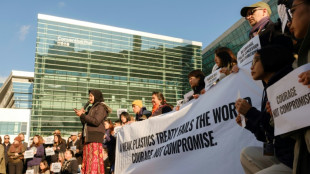
-
 British MPs debate contentious assisted dying law
British MPs debate contentious assisted dying law
-
Macron offers first glimpse of post-fire Notre Dame

-
 Syria jihadists, allies shell Aleppo in shock offensive
Syria jihadists, allies shell Aleppo in shock offensive
-
Japan government approves $92 bn extra budget

-
 Toll in Syria jihadist-army fighting rises to 242: monitor
Toll in Syria jihadist-army fighting rises to 242: monitor
-
UK transport secretary quits in setback for Starmer

-
 Days before deadline, plastic treaty draft highlights disagreement
Days before deadline, plastic treaty draft highlights disagreement
-
Crypto boss eats banana art he bought for $6.2 million

-
 Teen news boss criticises Australian social media ban
Teen news boss criticises Australian social media ban
-
Taiwan detects 41 Chinese military aircraft, ships ahead of Lai US stopover

-
 Spain urged to 'build differently' after deadly floods
Spain urged to 'build differently' after deadly floods
-
WTO chief faces heavy task as Trump threat looms

-
 Herbert takes control at Australian Open as Smith tanks
Herbert takes control at Australian Open as Smith tanks
-
Israel PM again warns Iran after top diplomat talks of revising nuclear doctrine

-
 Brilliant Brook's 132 puts England on top against sloppy New Zealand
Brilliant Brook's 132 puts England on top against sloppy New Zealand
-
Brilliant Brook's 132 puts England on top against New Zealand

-
 US landmine offer to Ukraine throws global treaty into 'crisis': campaign group
US landmine offer to Ukraine throws global treaty into 'crisis': campaign group
-
Singapore hangs 4th person in three weeks

-
 Five things to know about NewJeans' shock split from agency
Five things to know about NewJeans' shock split from agency
-
Waste pickers battle for recognition at plastic treaty talks

-
 Ireland votes in closely fought general election
Ireland votes in closely fought general election
-
Top UN court to open unprecedented climate hearings

-
 European countries that allow assisted dying
European countries that allow assisted dying
-
British MPs to debate contentious assisted dying law

-
 Schmidt not expecting hero's welcome on Ireland return
Schmidt not expecting hero's welcome on Ireland return
-
PSG stuck between domestic dominance and Champions League woes

-
 'Hot fight' as unbeaten Bayern visit Dortmund fortress
'Hot fight' as unbeaten Bayern visit Dortmund fortress
-
Bordeaux-Begles' Samu 'not finished yet' with Wallabies

-
 Brook and Pope half-centuries haul England to 174-4 against NZ
Brook and Pope half-centuries haul England to 174-4 against NZ
-
Yen rallies on rate hike bets as equity markets swing

-
 Ukraine superstar Mahuchikh brings 'good vibes' to her war-torn country
Ukraine superstar Mahuchikh brings 'good vibes' to her war-torn country
-
PlayStation at 30: How Sony's grey box conquered gaming

-
 Saudi Arabia hosts UN talks on drought, desertification
Saudi Arabia hosts UN talks on drought, desertification
-
PlayStation: Fun facts to know as Sony's console turns 30

-
 Nepal's first transgender candidates run for local office
Nepal's first transgender candidates run for local office
-
Father of PlayStation says 'everyone told us we would fail'

-
 Ireland seek to overcome former coach Schmidt's Wallabies
Ireland seek to overcome former coach Schmidt's Wallabies
-
Detroit survive Bears comeback to make it 10 wins in a row

-
 Mexican actor Silvia Pinal dead at 93
Mexican actor Silvia Pinal dead at 93
-
'Black Friday' deals target inflation-weary US consumers

-
 Liverpool look to deepen Man City crisis, Amorim seeks first Premier League win
Liverpool look to deepen Man City crisis, Amorim seeks first Premier League win
-
Police fire rubber bullets, tear gas at Georgia protesters after PM delays EU bid

-
 England lose three quick wickets in reply to New Zealand's 348
England lose three quick wickets in reply to New Zealand's 348
-
Social media companies slam Australia's under-16 ban

-
 Police fire tear gas at Georgia protesters after PM delays EU bid
Police fire tear gas at Georgia protesters after PM delays EU bid
-
Canada watchdog sues Google over 'anti-competitive' ad tech

-
 Hojlund gives Amorim winning Old Trafford bow, Roma hold Spurs
Hojlund gives Amorim winning Old Trafford bow, Roma hold Spurs
-
Amorim wins first Man Utd home game after rollercoaster ride

-
 France arrests 26 as South Asian migrant trafficking ring smashed
France arrests 26 as South Asian migrant trafficking ring smashed
-
At least 15 dead, 113 missing, in Uganda landslides


Pakistan's brick workers need kilns reignited after floods
The brick kilns that dominate the small village of Aqilpur in Pakistan's Punjab province now lie abandoned, furnaces extinguished by weeks of torrential rain that have caused the worst floods in the country's history.
Though the floods that engulfed Aqilpur and its surrounding fields have receded from the highs of a week ago, the kilns are still surrounded by water.
Most of those who lived on-site -- part of the country's millions-strong workforce known as "daily wagers" because of their piecemeal salaries -- abandoned their homes for higher, dry ground.
"I come here daily on my bicycle and go from one kiln to another to look for work but find nothing," said Muhammad Ayub, an itinerant labourer.
Now, a road that runs through the village has become a kind of town square for the kiln workers, who find themselves both homeless and out of work.
Ayub, 40, has a sick mother and an eight-year-old daughter to provide for.
When his home was destroyed in the torrential rains that preceded the flood, he sent them to a relative's house close to the village.
But once the flood hit, his family was forced to take refuge at a makeshift campsite on higher ground outside the village.
More than 33 million people in Pakistan have been affected by the flooding, brought on by record monsoon rains that have swamped a third of the country, causing at least 1,300 deaths.
The floods have destroyed or badly damaged nearly two million homes or business premises, and for the rebuilding process to begin, kilns like those in Aqilpur will have to fire up again.
- Earning less than $3 a shift -
There are thousands of small brick factories and kilns scattered across much of Pakistan -- a vital supplier of building materials for the nation of 220 million.
For now, mounds of bricks that should be making their way to building sites across the country lie partially submerged in floodwater.
Ayub worked 12 hours a night making bricks, earning less than $3 (600 rupees) a shift for his labours.
He would spend the mornings working the fields surrounding the village, and was only able to sleep briefly in the afternoon before his shift began again.
With the kilns shut down and the fields submerged, his daily wage is gone.
"Where should a labourer go? he asked AFP.
"Wherever the workers go to look for work, they come back empty-handed."
Daily wagers make up one of the poorest segments of Pakistan's society and many in rural areas are exploited by unscrupulous large-scale farmers and factory owners who keep them in virtual servitude.
The brickworks in particular are notorious for hiring child labour -- illegal under Pakistan law.
One of the youngest among the 50 or so kiln workers camped near Aqilpur is Muhammad Ismail, who joined his father at the brickworks almost a year ago when he turned 12.
He helped mould the clay that makes the bricks before they went into the furnace, hoping his labours would help his parents feed his six younger siblings.
After fleeing their home in the flood, Ismail's father had to borrow money to buy flour and other necessities for his family.
"But now we are in debt," Ismail said.
"I have been searching for work with my father every day. We need to pay off our debt, but I'm losing hope."
It is not uncommon in parts of Pakistan for those who incur debt and fail to pay it back to be forced into bonded labour for years, as interest on the original sum keeps mounting.
This debt can often be handed down from one generation to another.
The kiln workers of Aqilpur have petitioned the owner to spark up the furnaces so they can resume work, but Ayub thinks they are asking for the impossible.
"The water collected here isn't going to dry up for at least three months," he said.
"And after the water dries, it will take another two or two-and-half months for the repairs."
O.Bulka--BTB
